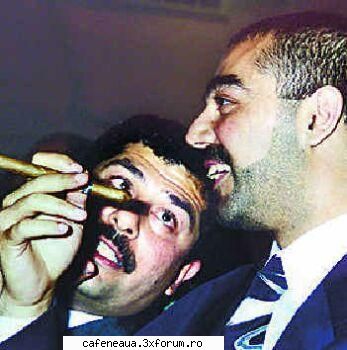Ovidiu
Administrator
 Inregistrat: acum 19 ani
Postari: 8044
|
|

Uday Saddam Hussein al-Tikriti
Uday [Odai, pronounced "aw-DAY"] was born in 1964, the oldest of five children from Saddam's marriage to his first cousin Sajida. Uday, who was notoriously greedy, flashy and corrupt, had staked a claim to power through parliamentary politics. He was elected to the National Assembly in the spring of 2000 - although it took him some six to eight months to physically show up and take his seat in the rubber-stamp parliament.
Uday seemed unlikely to succeed his father, although he controled the state media and a small security force. A 1996 assassination attempt left him temporarily paralyzed, and he was reported to remain in generally poor health. Uday alienated important figures in Saddam's inner circle.
Uday was credited with having a part in the early 1996 killing of his two brothers-in-law, Hussein Kamel and Saddam Kamel, who were married to Uday's sisters Raghd and Rana. Hussein Kamel, a former head of Iraq's military industries and a key player in the country's non-conventional weapons program, had defected to Jordan in August 1995 with his brother, who had headed Saddam's personal guard. The two were lured back to Baghdad, and to their deaths, by promises of an amnesty. Uday is thought to have been responsible for the Kamels' defection in the first place, after threatening to have Hussein arrested.
In December 1996, Uday was shot, gravely injured and some say partially paralyzed by unknown assailants who were thought to have been taking revenge for one or other of Uday's killings and maimings. The intelligence services were unable to find the perpetrators of the assassination attempt against Uday (with the exception of Ali Izzat, a former member of a military office whose sports car was found near the site of the assassination attempt in Baghdad's Mansur district and who was liquidated one week after the assassination attempt which took place in December 1996).
In 1998, Uday killed Hanna Jajo, Saddam's most trusted food-taster and procurer of women. Jajo had acted as the go-between for Saddam and Samira, who became his second wife and the mother of now-teenage Ali. (Saddam remained married to Sajida, despite at least two other known marriages.) It was reported that Uday, said to be closer to his mother than to his father, arranged a party for Suzanne Mubarak, the wife of the Egyptian president, on the banks of the Tigris in downtown Baghdad. Across the river, on the Island of Pigs, Jajo was also entertaining. He and his rather rowdy bunch were shooting salvos in the air. Uday crossed the Tigris and asked Jajo to stop. Some time later Jajo fired again. Uday returned and clubbed Jajo to death.
Uday was Iraq's media czar, and he owned the Babil daily paper, the weekly Rafidayn and the Al-Shabab TV station. Uday took control of vast sections of the media, which was not part of a wider strategy of Saddam himself, but a role that Uday carved out for himself. Who controls information in the country, wields great power. Within two years after the uprising (by 1993) Uday had taken over part of the work that used to be done by the Ministry of Culture and Information. Besides, he set up his own parallel system of media: a newspaper, a radio station, a TV station. There was also a high degree of interference on his part into the daily work of the Ministry of Culture and Information which has in itself led to friction and human rights violations.
Uday also acted as an unofficial minister of youth overseeing student organizations and cultural activities, and reigned over Iraq's Olympic Committee. In May 2001, Saad Keis Naoman, an Iraqi soccer player who defected to Europe, reported that he and his teammates were beaten and humiliated at the order of Uday Saddam Hussein for poor performances. He was flogged until his back was bloody, forcing him to sleep on his stomach in the tiny cell in Al-Radwaniya prison in which he was jailed. His account supported allegations made by Sharar Haydar Mohamad Al-Hadithi, a former Iraqi international soccer player, who stated in August 1999 that he and his teammates were tortured on Uday Hussein's orders for not winning matches. In 2000, three soccer players who played for a team that lost an October game in the Asian Cup quarter finals, reportedly were whipped and detained for 3 days. In 1997, members of the national football team reportedly were beaten and tortured on Uday's orders because of poor play in a World Cup qualifying match.
Following a raid conducted on July 22, 2003, by Task Force 20 on a residence in Mosul Iraq, and which resulted in a protracted firefight, CENTCOM confirmed that Uday Hussein died during the operation, along with his brother Qusay and two other people.

27.3KB
_______________________________________
[
|
|
